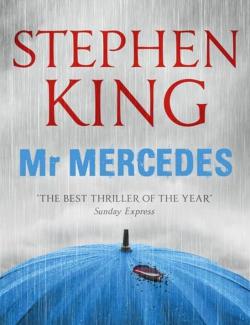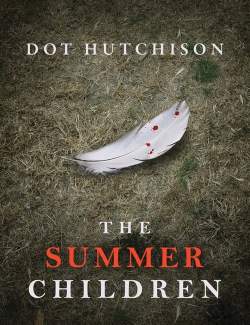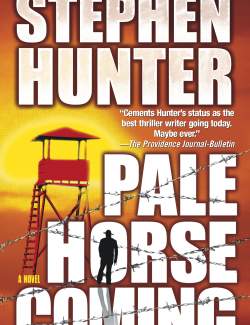Mr. Mercedes
(×òîáû ïåðåâîäèòü ñëîâà íà ðóññêèé ÿçûê è äîáàâëÿòü â ñëîâàðü äëÿ èçó÷åíèÿ, ùåëêàåì ìûøêîé íà íóæíîå ñëîâî).
Stephen King MR. MERCEDES A NOVEL Thinking of James M. Cain They threw me off the hay truck about noon… GRAY MERCEDES April 9–10, 2009 Augie Odenkirk had a 1997 Datsun that still ran well in spite of high mileage, but gas was expensive, especially for a man with no job, and City Center was on the far side of town, so he decided to take the last bus of the night. He got off at twenty past eleven with his pack on his back and his rolled-up sleeping bag under one arm. He thought he would be glad of the down-filled bag by three A.M. The night was misty and chill. “Good luck, man,” the driver said as he stepped down. “You ought to get something for just being the first one there.” Only he wasn’t. When Augie reached the top of the wide, steep drive leading to the big auditorium, he saw a cluster of at least two dozen people already waiting outside the rank of doors, some standing, most sitting. Posts strung with yellow DO NOT CROSS tape had been set up, creating a complicated passage that doubled back on itself, mazelike. Augie was familiar with these from movie theaters and the bank where he was currently overdrawn, and understood the purpose: to cram as many people as possible into as small a space as possible. As he approached the end of what would soon be a conga-line of job applicants, Augie was both amazed and dismayed to see that the woman at the end of the line had a sleeping baby in a Papoose carrier. The baby’s cheeks were flushed with the cold; each exhale came with a faint rattle. The woman heard Augie’s slightly out-of-breath approach, and turned. She was young and pretty enough, even with the dark circles under her eyes. At her feet was a small quilted carry-case. Augie supposed it was a baby support system. “Hi,” she said. “Welcome to the Early Birds Club.” “Hopefully we’ll catch a worm.” He debated, thought what the hell, and stuck out his hand. “August Odenkirk. Augie. I was recently downsized. That’s the twenty-first-century way of saying I got canned.” She shook with him. She had a good grip, firm and not a bit timid. “I’m Janice Cray, and my little bundle of joy is Patti. I guess I got downsized, too. I was a housekeeper for a nice family in Sugar Heights. He, um, owns a car dealership.” Augie winced. Janice nodded. “I know. He said he was sorry to let me go, but they had to tighten their belts.” “A lot of that going around,” Augie said, thinking: You could find no one to babysit? No one at all? “I had to bring her.” He supposed Janice Cray didn’t have to be much of a mind reader to know what he was thinking. “There’s no one else. Literally no one. The girl down the street couldn’t stay all night even if I could pay her, and I just can’t. If I don’t get a job, I don’t know what we’ll do.” “Your parents couldn’t take her?” Augie asked. “They live in Vermont. If I had half a brain, I’d take Patti and go there. It’s pretty. Only they’ve got their own problems. Dad says their house is underwater. Not literally, they’re not in the river or anything, it’s something financial.” Augie nodded. There was a lot of that going around, too. A few cars were coming up the steep rise from Marlborough Street, where Augie had gotten off the bus. They turned left, into the vast empty plain of parking lot that would no doubt be full by daylight tomorrow… still hours before the First Annual City Job Fair opened its doors. None of the cars looked new. Their drivers parked, and from most of them three or four job-seekers emerged, heading toward the doors of the auditorium. Augie was no longer at the end of the line. It had almost reached the first switchback. “If I can get a job, I can get a sitter,” she said. “But for tonight, me and Patti just gotta suck it up.” The baby gave a croupy cough Augie didn’t care for, stirred in the Papoose, and then settled again. At least the kid was bundled up; there were even tiny mittens on her hands. Kids survive worse , Augie told himself uneasily. He thought of the Dust Bowl, and the Great Depression. Well, this one was great enough for him. Two years ago, everything had been fine. He hadn’t exactly been living large in the ’hood, but he had been making ends meet, with a little left over at the end of most months. Now everything had turned to shit. They had done something to the money. He didn’t understand it; he’d been an office drone in the shipping department of Great Lakes Transport, and what he knew about was invoices and using a computer to route stuff by ship, train, and air. “People will see me with a baby and think I’m irresponsible,” Janice Cray fretted. “I know it, I see it on their faces already, I saw it on yours. But what else could I do? Even if the girl down the street could stay all night, it would have cost eighty-four dollars. Eighty-four! I’ve got next month’s rent put aside, and after that, I’m skint.” She smiled, and in the light of the parking lot’s high arc-sodiums, Augie saw tears beading her eyelashes. “I’m babbling.” “No need to apologize, if that’s what you’re doing.” The line had turned the first corner now, and had arrived back at where Augie was standing. And the girl was right. He saw lots of people staring at the sleeping kid in the Papoose. “Oh, that’s it, all right. I’m a single unmarried mother with no job. I want to apologize to everyone, for everything.” She turned and looked at the banner posted above the rank of doors. 1000 JOBS GUARENTEED! it read. And below that: “We Stand With the People of Our City!” —MAYOR RALPH KINSLER . “Sometimes I want to apologize for Columbine, and 9/11, and Barry Bonds taking steroids.” She uttered a semi-hysterical giggle. “Sometimes I even want to apologize for the space shuttle exploding, and when that happened I was still learning to walk.” “Don’t worry,” Augie told her. “You’ll be okay.” It was just one of those things that you said. “I wish it wasn’t so damp, that’s all. I’ve got her bundled up in case it was really cold, but this damp…” She shook her head. “We’ll make it, though, won’t we, Patti?” She gave Augie a hopeless little smile. “It just better not rain.” • • • It didn’t, but the dampness increased until they could see fine droplets suspended in the light thrown by the arc-sodiums. At some point Augie realized that Janice Cray was asleep on her feet. She was hipshot and slump-shouldered, with her hair hanging in dank wings around her face and her chin nearly on her breastbone. He looked at his watch and saw it was quarter to three. Ten minutes later, Patti Cray awoke and started to cry. Her mother (her baby mama , Augie thought) gave a jerk, voiced a horselike snort, raised her head, and tried to pull the infant out of the Papoose. At first the kid wouldn’t come; her legs were stuck. Augie pitched in, holding the sides of the sling. As Patti emerged, now wailing, he could see drops of water sparkling all over her tiny pink jacket and matching hat. “She’s hungry,” Janice said. “I can give her the breast, but she’s also wet. I can feel it right through her pants. God, I can’t change her in this—look how foggy it’s gotten!” Augie wondered what comical deity had arranged for him to be the one in line behind her. He also wondered how in hell this woman was going to get through the rest of her life—all of it, not just the next eighteen years or so when she would be responsible for the kid. To come out on a night like this, with nothing but a bag of diapers! To be that goddam desperate! He had put his sleeping bag down next to Patti’s diaper bag. Now he squatted, pulled the ties, unrolled it, and unzipped it. “Slide in there. Get warm and get her warm. Then I’ll hand in whatever doodads you need.” She gazed at him, holding the squirming, crying baby. “Are you married, Augie?” “Divorced.” “Children?” He shook his head. “Why are you being so kind to us?” “Because we’re here,” he said, and shrugged. She looked at him a moment longer, deciding, then handed him the baby. Augie held her out at arms’ length, fascinated by the red, furious face, the bead of snot on the tiny upturned nose, the bicycling legs in the flannel onesie. Janice squirmed into the sleeping bag, then lifted her hands. “Give her to me, please.” Augie did, and the woman burrowed deeper into the bag. Beside them, where the line had doubled back on itself for the first time, two young men were staring. “Mind your business, guys,” Augie said, and they looked away. “Would you give me a diaper?” Janice said. “I should change her before I feed her.” He dropped one knee to the wet pavement and unzipped the quilted bag. He was momentarily surprised to find cloth diapers instead of Pampers, then understood. The cloth ones could be used over and over. Maybe the woman wasn’t entirely hopeless. “I see a bottle of Baby Magic, too. Do you want that?” From inside the sleeping bag, where now only a tuft of her brownish hair showed: “Yes, please.” He passed in the diaper and the lotion. The sleeping bag began to wiggle and bounce. At first the crying intensified. From one of the switchbacks farther down, lost in the thickening fog, someone said: “Can’t you shut that kid up?” Another voice added: “Someone ought to call Social Services.” Augie waited, watching the sleeping bag. At last it stopped moving around and a hand emerged, holding a diaper. “Would you put it in the bag? There’s a plastic sack for the dirty ones.” She looked out at him like a mole from its hole. “Don’t worry, it’s not pooey, just wet.” Augie took the diaper, put it in the plastic bag (COSTCO printed on the side), then zipped the diaper bag closed. The crying from inside the sleeping bag (so many bags , he thought) continued for another minute or so, then abruptly cut out as Patti began to nurse in the City Center parking lot. From above the ranked doors that wouldn’t open for another six hours, the banner gave a single lackadaisical flap. 1000 JOBS GUARENTEED! Sure, Augie thought. Also, you can’t catch AIDS if you load up on vitamin C . Twenty minutes passed. More cars came up the hill from Marlborough Street. More people joined the line. Augie estimated there already had to be four hundred people waiting. At that rate, there would be two thousand by the time the doors opened at nine, and that was a conservative estimate. If someone offers me fry-cook at McDonald’s, will I take it? Probably. What about a greeter at Walmart? Oh, mos def. Big smile and how’re you today? Augie thought he could wallop a greeter job right out of the park. I’m a people person, he thought. And laughed. From the bag: “What’s funny?” “Nothing,” he said. “Cuddle that kid.” “I am.” A smile in her voice. • • • At three-thirty he knelt, lifted the flap of the sleeping bag, and peered inside. Janice Cray was curled up, fast asleep, with the baby at her breast. This made him think of The Grapes of Wrath . What was the name of the girl who had been in it? The one who ended up nursing the man? A flower name, he thought. Lily? No. Pansy? Absolutely not. He thought of cupping his hands around his mouth, raising his voice, and asking the crowd, WHO HERE HAS READ THE GRAPES OF WRATH? As he was standing up again (and smiling at this absurdity), the name came to him. Rose. That had been the name of the Grapes of Wrath girl. But not just Rose; Rose of Sharon . It sounded biblical, but he couldn’t say so with any certainty; he had never been a Bible reader. He looked down at the sleeping bag, in which he had expected to spend the small hours of the night, and thought of Janice Cray saying she wanted to apologize for Columbine, and 9/11, and Barry Bonds. Probably she would cop to global warming as well. Maybe when this was over and they had secured jobs—or not; not was probably just as likely—he would treat her to breakfast. Not a date, nothing like that, just some scrambled eggs and bacon. After that they would never see each other again. More people came. They reached the end of the posted switchbacks with the self-important DO NOT CROSS tape. Once that was used up, the line began to stretch into the parking lot. What surprised Augie—and made him uneasy—was how silent they were. As if they all knew this mission was a failure, and they were only waiting to get the official word. The banner gave another lackadaisical flap. The fog continued to thicken. • • • Shortly before five A.M., Augie roused from his own half-doze, stamped his feet to wake them up, and realized an unpleasant iron light had crept into the air. It was the furthest thing in the world from the rosy-fingered dawn of poetry and old Technicolor movies; this was an anti-dawn, damp and as pale as the cheek of a day-old corpse. He could see the City Center auditorium slowly revealing itself in all its nineteen-seventies tacky architectural glory. He could see the two dozen switchbacks of patiently waiting people and then the tailback of the line disappearing into the fog. Now there was a little conversation, and when a janitor clad in gray fatigues passed through the lobby on the other side of the doors, a small satiric cheer went up. “Life is discovered on other planets!” shouted one of the young men who had been staring at Janice Cray—this was Keith Frias, whose left arm would shortly be torn from his body. There was mild laughter at this sally, and people began to talk. The night was over. The seeping light wasn’t particularly encouraging, but it was marginally better than the long small hours just past. Augie knelt beside his sleeping bag again and cocked an ear. The small, regular snores he heard made him smile. Maybe his worry about her had been for nothing. He guessed there were people who went through life surviving—perhaps even thriving—on the kindness of strangers. The young woman currently snoozing in his sleeping bag with her baby might be one of them. It came to him that he and Janice Cray could present themselves at the various application tables as a couple. If they did that, the baby’s presence might not seem an indicator of irresponsibility but rather of joint dedication. He couldn’t say for sure, much of human nature was a mystery to him, but he thought it was possible. He decided he’d try the idea out on Janice when she woke up. See what she thought. They couldn’t claim marriage; she wasn’t wearing a wedding ring and he’d taken his off for good three years before, but they could claim to be… what was it people said now? Partners. Cars continued to come up the steep incline from Marlborough Street at steady tick-tock intervals. There would soon be pedestrians as well, fresh off the first bus of the morning. Augie was pretty sure they started running at six. Because of the thick fog, the arriving cars were just headlights with vague shadow-shapes lurking behind the windshields. A few of the drivers saw the huge crowd already waiting and turned around, discouraged, but most kept on, heading for the few remaining parking spaces, their taillights dwindling. Then Augie noticed a car-shape that neither turned around nor continued on toward the far reaches of the parking lot. Its unusually bright headlights were flanked by yellow fog-lamps. HD headers, Augie thought. That’s a Mercedes-Benz. What’s a Benz doing at a job fair? He supposed it might be Mayor Kinsler, here to make a speech to the Early Birds Club. To congratulate them on their gumption, their good old American git-up-and-git. If so, Augie thought, arriving in his Mercedes—even if it was an old one—was in bad taste. An elderly fellow in line ahead of Augie (Wayne Welland, now in the last moments of his earthly existence) said: “Is that a Benz? It looks like a Benz.” Augie started to say of course it was, you couldn’t mistake a Mercedes’s HD headlamps, and then the driver of the car directly behind the vague shape laid on his horn—a long, impatient blast. The HD lights flashed brighter than ever, cutting brilliant white cones through the suspended droplets of the fog, and the car leaped forward as if the impatient horn had goosed it. “Hey!” Wayne Welland said, surprised. It was his final word. The car accelerated directly at the place where the crowd of job-seekers was most tightly packed, and hemmed in by the DO NOT CROSS tapes. Some of them tried to run, but only the ones at the rear of the crowd were able to break free. Those closer to the doors—the true Early Birds—had no chance. They struck the posts and knocked them over, they got tangled in the tapes, they rebounded off each other. The crowd swayed back and forth in a series of agitated waves. Those who were older and smaller fell down and were trampled underfoot. Augie was shoved hard to the left, stumbled, recovered, and was pushed forward. A flying elbow struck his cheekbone just below his right eye and that side of his vision filled with bright Fourth of July sparkles. From the other eye he could see the Mercedes not just emerging from the fog but seeming to create itself from it. A big gray sedan, maybe an SL500, the kind with twelve cylinders, and right now all twelve were screaming. Augie was driven to his knees beside the sleeping bag, and kicked repeatedly as he struggled to get back up: in the arm, in the shoulder, in the neck. People were screaming. He heard a woman cry, “Look out, look out, he’s not stopping!” He saw Janice Cray pop her head out of the sleeping bag, eyes blinking in bewilderment. Once more he was reminded of a shy mole peering from its hole. A lady mole with a bad case of bed head. He scrambled forward on his hands and knees and lay down on the bag and the woman and baby inside, as if by doing this he could successfully shield them from a two-ton piece of German engineering. He heard people yelling, the sound of them almost lost beneath the approaching roar of the big sedan’s motor. Someone fetched him a terrific wallop on the back of his head, but he barely felt it. There was time to think: I was going to buy Rose of Sharon breakfast. There was time to think: Maybe he’ll veer off. That seemed to be their best chance, probably their only chance. He started to raise his head to see if it was happening, and a huge black tire ate up his vision. He felt the woman’s hand grip his forearm. He had time to hope the baby was still sleeping. Then time ran out. DET.-RET. 1 Hodges walks out of the kitchen with a can of beer in his hand, sits down in the La-Z-Boy, and puts the can down on the little table to his left, next to the gun. It’s a .38 Smith
Èíôîðìàöèÿ
Ïîñåòèòåëè, íàõîäÿùèåñÿ â ãðóïïå Ãîñòè, íå ìîãóò îñòàâëÿòü êîììåíòàðèè ê äàííîé ïóáëèêàöèè.

















